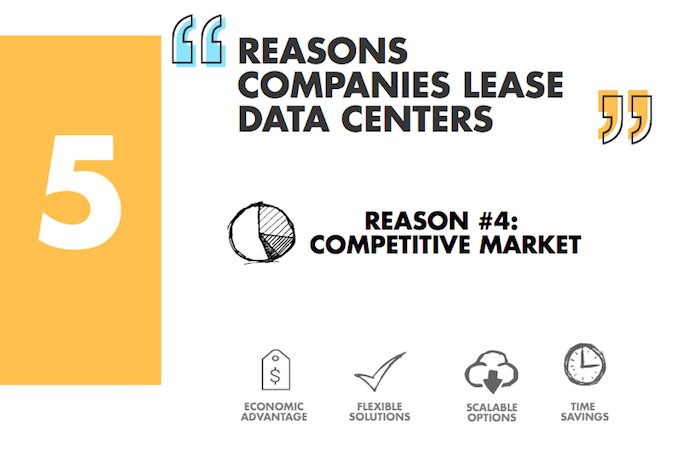By Luke Smith · 4/26/2016

Leasing data center infrastructure through cloud or colocation has become a primary data center solution for many companies. While owning and operating their own data center can be a better solution for some organizations, most companies find leasing infrastructure provides many benefits. In our recent blog series, we are examining the advantages leasing provides, such as economic savings, flexibility, and the scalability. Another reason many companies move toward leasing their data center infrastructure is directly tied to the competitive market.
Over the past several years, data center markets have grown in size by investments from both small and large data center operators. The top six publicly traded data center real estate investment trusts grew their revenue by 21% last year alone. The competition created by this growth creates significant advantages for companies interested and open to leasing their data center infrastructure.
Improved Service Offerings
Data center users now look to partner with operators offering the services they need both now and in the future. As their IT strategies change, a company’s data center infrastructure needs change as well. To create an attractive offering, data center providers now offer a broad range of services in order to meet needs any user might have. Many of the acquisitions over the last three years in the data center industry were directly tied to increased service offerings. Today’s data center operators now provide disaster recovery, cloud, managed services, colocation, interconnection, and other options in their list of available services. This diversity comes from increased competition and the desire for data center providers to meet the needs of as many customers as possible for a long period of time.
Improved Facilities
Providers need a broad variety of services to meet the needs of their customers, but also need to offer facilities supporting and maintaining the customer’s infrastructure. Because of the increased competition, providers are building facilities better than ever before. These facilities now provide greater efficiencies, infrastructure redundancy options, and the ability to accommodate higher densities. In addition, the data center providers’ operational procedures have improved over time, and these companies are now focused on constructing facilities with greater uptime, critical systems, redundancy, security, compliance, and connectivity in order to stay ahead of their competition and reach a larger group of customers.
Improved Economics
The market maturity and competition in the data center market drives improved pricing and rates for users. Compared to five years ago, providers are offering their infrastructure and services at more aggressive rates. This competition also allows users interested in renewing contracts the ability to achieve a fair market rate transaction. In addition, these rates tied to infrastructure and services are negotiable and provide users the opportunity to partner with the most well suited provider.
Ultimately, the competitive market benefits the user leasing infrastructure from a provider. Data center operators are interested in growing their existing customer needs and winning new customers, causing them to provide refined services, facilities, and aggressive solutions. The competition in primary and secondary data center markets creates advantages directly benefitting and impacting data center users, and will continue to.